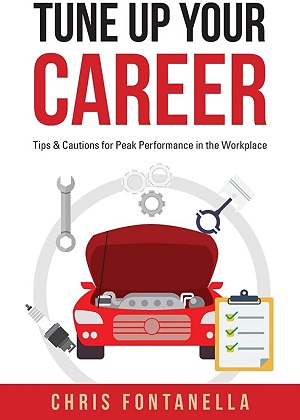“Careers—like cars—also need to be brought to the ‘shop’ for maintenance. Problems need to be fixed before they become bigger issues. You might be saying to yourself, I hate my job, or This is not the role for me, or Something doesn’t feel right about being at this company, or I know I graduated with a degree in accounting, but I think I want to be a veterinarian. These and other thoughts like them may be driving around the streets and avenues of your mind and heart. The dashboard lights of your career engine are flashing.
Best to let someone take a look under the hood before it’s too late,” writes Chris Fontanella in Tune Up Your Career: Tips & Cautions for Peak Performance in the Workplace. “…I issue a warning about greed (presented in two different ways in chapters 8 and 9). Money is not a bad thing in and of itself. On the surface, having more of it seems better than having less of it; at least that’s the way I see it. That said, an inordinate focus on obtaining it can be detrimental. There is sure to be some form of collateral damage when the love of money is an ‘unsleeping, ever-pacing thought,’ as Melville says of Ahab’s obsession to kill Moby Dick.
Lest the maintenance tips offered be confused with suggestions for ‘striking it rich’—though I believe they do lead to a ‘wealthy’ life—it seems appropriate to strike at least one cautionary note. This section ends with a parable to drive home the point that an unquenching desire for ‘more, more, more’ can make you ‘poor, poor, poor.’ Lastly, a feature called Spark Plugs ends each chapter, reviewing key points that can be easily referenced later and offering a few exercises that reinforce the material in the chapter. Just as a mechanic takes steps to tune up a car’s engine, so, too, should you take steps to improve the performance of your career engine.”
AMAZON: https://www.amazon.com/Tune-Your-Career-Performance-Workplace/dp/1959099078
He also states, “…Uncertainty is unsettling. It disturbs the status quo of one’s day-to-day existence. But it also reminds us of the inevitability of change and the need to adapt, which is a good thing. Living in a state of ambiguity can be hard, but once the ‘unknown’ steps out from the shadows—and we understand what we are dealing with—then we can make decisions. ‘Uncertainty,’ says Ram Charan in his book The Attacker’s Advantage, ‘is not something to fear, but rather something to immerse yourself in, because in it lie the possibilities you can combine to create something new and immensely valuable’…
Employment life—and life in general—is dynamic, not static. ‘To imagine that things in this life [and in your career] are always to remain as they are,’ says Cervantes in Don Quixote, ‘is to indulge in an idle dream.’ Sorry to be the one to tell you, but in this life nothing ever stays the same, including your job. After making the unlikely, unpopular decision not to be a minister, I had no idea what to do with myself or what direction my ‘career’ would take. Dreams and desires danced in my head like the Sugar Plum Fairy and the three windup dolls in The Nutcracker, but I felt lost. My future was as uncertain as what’s going to happen in the year 2065.”
By willing to use personalized analogies as much as objective presentations, Fontanella succeeds in what he has set out to do. Simply put, make a leadership and business advice book that actually works.
Cyrus Rhodes



























